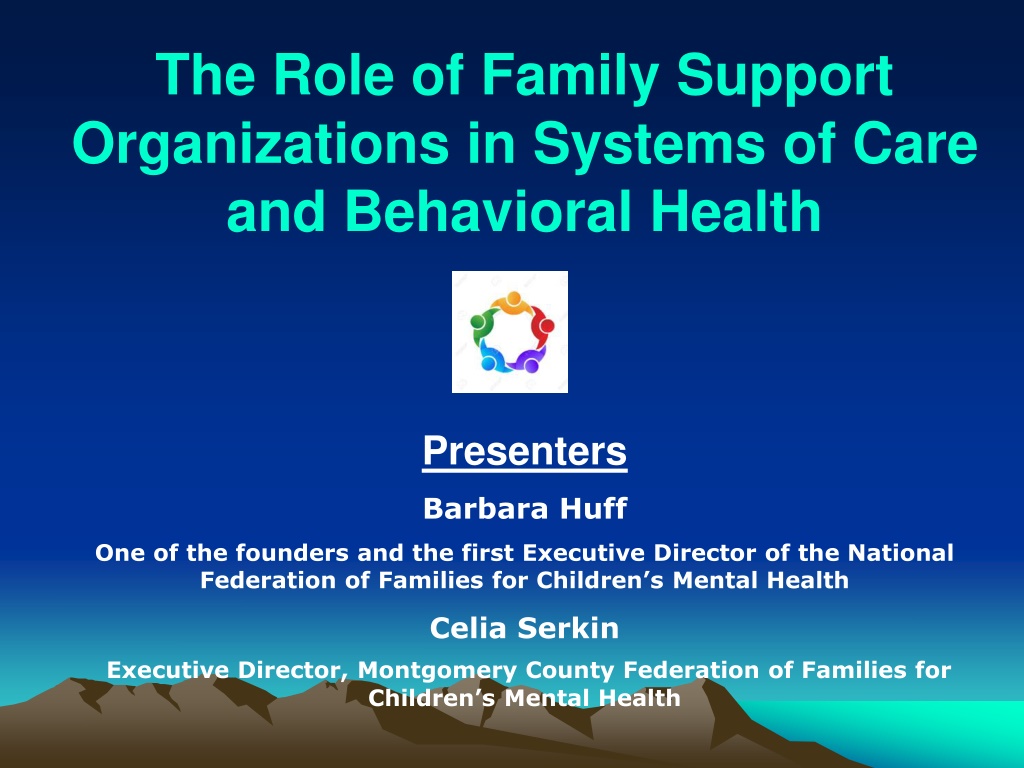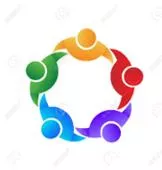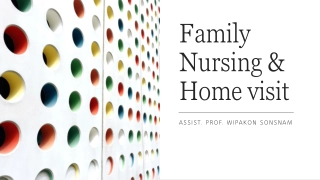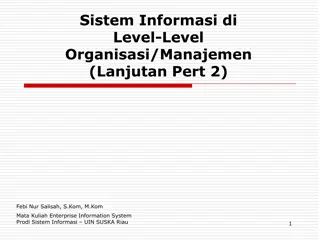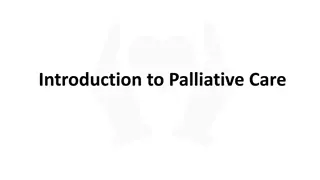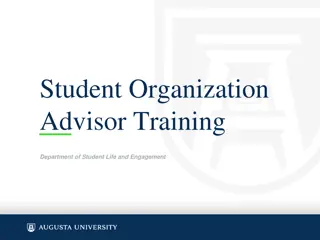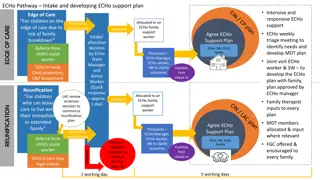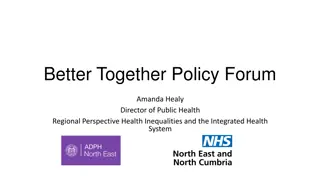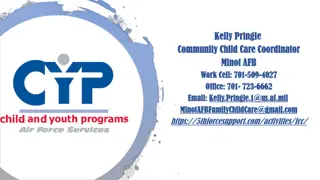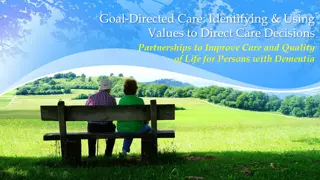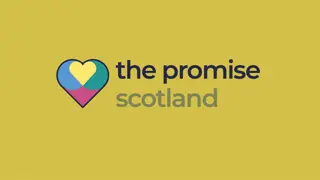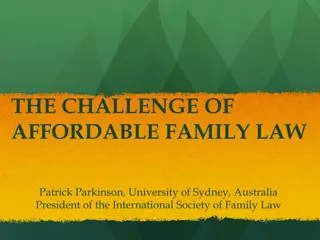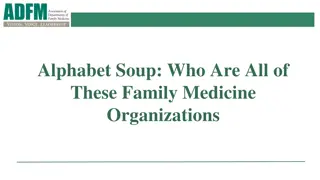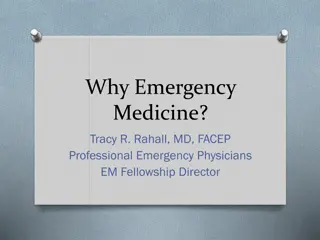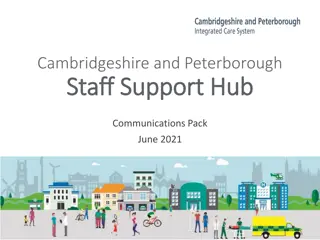Empowering Families in Behavioral Health: The Role of Family Support Organizations
Explore the pivotal role of family support organizations in behavioral health systems, understanding family-driven care, promoting family partnerships, and utilizing family peer support services. Delve into the challenges faced and the evolution of parental views over the years, emphasizing the importance of empowering families to make decisions regarding their children's well-being.
Download Presentation

Please find below an Image/Link to download the presentation.
The content on the website is provided AS IS for your information and personal use only. It may not be sold, licensed, or shared on other websites without obtaining consent from the author. Download presentation by click this link. If you encounter any issues during the download, it is possible that the publisher has removed the file from their server.
E N D
Presentation Transcript
The Role of Family Support Organizations in Systems of Care and Behavioral Health Presenters Barbara Huff One of the founders and the first Executive Director of the National Federation of Families for Children s Mental Health Celia Serkin Executive Director, Montgomery County Federation of Families for Children s Mental Health
Objectives Understand the work of family support organizations. Identify key strategies to promote family partnership. Learn what family driven care is and why it is more than a good idea. Recognize how family peer support services play a key role in meeting the needs of children, youth, and young adults with behavioral health needs and their families. Appreciate how natural supports can assist families. 2
Initial Challenges No community-based services No collaboration across agencies Children were struggling in school Families were giving up custody of children to get services Very little research on children s mental health Very little trained workforce 5
Views of Parents Since the 1970's, views of parents seem to fall into four major categories: 1) As the cause of their child's/youth s problems, which makes them the focus or "target" for change 2) As having deficits and in need of education 3) As "clients" themselves in need of support and other services 4) As collaborators in the treatment/education of their child/youth with a focus on their strengths and resiliencies 6
Family-Driven Family-driven means families have the primary role in decisions regarding their children as well as the policies and procedures governing the well-being of all children in their community, state, tribe, territory and nation. This includes, but is not limited to: Identifying their strengths, challenges, desired outcomes/goals, and the steps needed to achieve those outcomes/goals; Designing, implementing, monitoring, and evaluating services, supports, programs, and systems; Choosing supports, services, and providers who are culturally and linguistically responsive and aware; and Partnering in decision-making at all levels. Source: National Federation of Families for Children s Mental Health 7
Guiding Values to Achieve Family-Driven Practice Families and youth, providers, administrators, and policymakers accept and support willingly and enthusiastically shared decision-making and responsibility for outcomes, as evidenced by: 1. Families and youth share and have access to accurate, understandable, and complete information necessary to set goals and to make informed decisions. 2. Families define their family composition and family decision-makers, whether biological, adoptive, foster, sibling, or surrogate family voice advocating on their behalf. 3. Families and family-run organizations engage in peer support to reduce isolation, achieve short-and long-term family goals, and strengthen family capacity and voice. 4. Families and family-run organizations provide direction for policy decisions that impact funding, supports, and services, including the right of families and youth to have meaningful voice at the individual and policy level. 8
5. Providers, agencies, and systems take the initiative to change policy and practice from provider-driven to family-driven. 6. Providers, agencies, and systems embrace family-driven practice, by allocating staff, training, support and resources to adequately fund and sustain family-driven services for children, youth and families, and the work of family and youth run organizations. 7. Community attitude change efforts focus on removing barriers and eliminating bias and discrimination. 8. Communities value and celebrate the diverse cultures of children, youth, and families and work to eliminate disparities. 9. Communities recognize that culture is an ever-changing dynamic and are responsive to the cultural and linguistic needs of all children, youth, and families. Source: National Federation of Families for Children s Mental Health 9
Family Partnership at Every Phase Designing Implementing Monitoring Evaluation 10
Structuring Family Involvement At All Levels of The System Level Structure - Examples Policy Voting on governing bodies Members of teams to write and review RFPs and contracts Members of systems design workgroup and advisory boards Management As part of quality improvement process Evaluators of system performance Trainers in training activities Program Supervisors Advisors to selecting personnel Members of their own child s/youth s team Family support partners, family navigators, care coordinators, peer mentors, and family navigators for other families Service 11
Building Blocks of the Partnership Treat people with dignity and respect. Express a caring, non-blaming attitude. Build on the strengths of the child/youth and family by fostering experiences that enhance control and independence. Try to understand the culture of the family and youth, their linguistic needs, and the values they espouse. Recognize what each partner brings and contributes to partnership. Acknowledge what each partner needs and wants and any constraints they may have because of their culture or organizational mandates. 13
Building Blocks of the Partnership (continued) Acknowledge the limits and the existence of other responsibilities that families, agency representatives, and providers may have. Identify the challenges and address them in a respectful way. Make decisions based on values of mutual respect. Share responsibility and power in the relationship, including joint decision making and problem solving. Utilize the unique experiences, skills and expertise of families and those of providers and agency representatives who are trying to help children/youth and their family. Demonstrate and model a commitment to shared accountability. Know that there are effective ways to address barriers to building partnerships. Celebrate the successes of the partnership! 14
Benefits of Partnering with Families Improved outcomes for youth and families Better engagement Families become committed to following up and following through Families more likely to re-engage in services as needed Services meet the needs of each individual family Families are better informed Local systems meet community needs
Family Support Organization in Montgomery County The Montgomery County Federation of Families for Children s Mental Health is a non-profit family and youth support organization run by: family members who have raised children/youth with behavioral health challenges; and young adults with life challenges.
Family Program Staff They are skilled, knowledgeable, and trained family members who have raised children/youth with behavioral health challenges. They provide direct services to parents and other primary caregivers who have children/youth with similar challenges. Individualized and targeted peer-to-peer support information and referral advocacy group support educational programs leadership opportunities
Young Adult Program Staff Youth MOVE Mo County ALL STARS They are skilled, knowledgeable, and trained young adults with lived experience dealing with behavioral health needs. They provide direct services to youth and young adults who have similar challenges. Individualized and targeted peer support information and referral advocacy group support educational programs leadership opportunities
Job Functions Family Support Partner Works primarily with family members enrolled in wraparound. Promotes the family member s full engagement and participation in all phases of wraparound. Plays an important role in promoting wraparound principles. Promotes family empowerment, self-advocacy, and self-efficacy. Family Navigator Works with family members who have children/youth with behavioral health challenges and other special needs. Helps family members navigate the child-serving systems, access services, and overcome barriers to obtaining what they need for their children/youth. Promotes family empowerment, self-advocacy, and self-efficacy. Youth Support Partners Works with youth and young adults with life challenges. Helps youth and youth adults access services and supports. Promotes youth empowerment, self-advocacy and self-efficacy. Facilitates events, training and other activities.
Family Support Model The staff work with parents and other primary caregivers to identify targets and benchmarks for focused and individualized family peer support. The staff provide peer support that helps parents and other primary caregivers resolve their own challenges and address their unique needs, while moving them to a legacy stage where they assist other families with similar issues. Parents and other primary caregivers have the opportunity to become leaders and genuine partners at all levels and phases and to influence local and state policy making. Parents and other primary caregivers become advocates for their own children and champions for other children/youth having similar needs.
Levels of Needs of Families Receiving Family Support Families needing intensive family support in order to attain advocacy and self-efficacy Families needing ongoing emotional support, connection to resources, and targeted advocacy Families needing to be linked to formal and informal direct service Families needing basic information
The Familys Journey Towards Self-Advocacy and Self-Efficacy
Key Role of Natural Supports Natural supports are the relationships individuals have every day in their lives unpaid, informal, ordinary relationships. Examples include, but are not limited to, a friend, a relative, a roommate, a member of a religious community, a teacher, or a mentor. Children/youth and their parents/caregivers receive these supports naturally from the individuals and organizations whose connection to the family is independent of the formal service system and its resources. These relationships and the support and assistance they offer, maintain, and enhance the quality and security of life for children/youth with behavioral health challenges and their families. Natural supports often have a high degree of importance and influence in the lives of children/youth with behavioral health challenges and their families. The sources of natural support are sustainable and thus most likely to be available for the children/youth and their families after providers or programs are no longer working with them. 24
Contact Information Barbara Huff One of the founders and the first Executive Director of the National Federation of Families for Children s Mental Health 316-648-6154 bhuff2837@sbcglobal.net www.huffosherconsulting.com Celia Serkin Executive Director, Montgomery County Federation of Families for Children s Mental Health 301-879-5200, ext. 27 301-412-3604 (cell) cserkin@mcfof.org 25
Websites Huff Osher Consulting www.huffosherconsulting.com FREDLA (Family Run Executive Director Leadership Association) www.fredla.org National Federation of Families for Children s Mental Health www.ffcmh.org Montgomery County Federation of Families for Children s Mental Health www.mcfof.org 26
